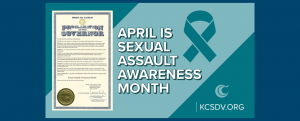- April 1, 2021
- Posted by: Kathy Ray
- Categories: 2021, All News & Blog Posts, Announcements & Statements, Press Releases

FOR IMMEDIATE RELEASE
April 1, 2021
April is Sexual Assault Awareness Month
TOPEKA – This week, Kansas Governor Laura Kelly issued a proclamation declaring the month of April 2021 as Sexual Assault Awareness Month. This year marks the official 20th anniversary of Sexual Assault Awareness Month, which is about awareness and prevention of sexual assault, harassment, and abuse.
According to the Centers for Disease Control and Prevention, 1 in 3 women and nearly 1 in 6 men experience some form of contact sexual violence in their lifetimes. “Sexual violence affects the lives of many Kansans, and it is critical that we work together to raise awareness,” said Joyce Grover, Executive Director of the Kansas Coalition Against Sexual and Domestic Violence.
Sexual assault and rape are some of the most underreported crimes, and there are a wide range of reasons why people do not report. The majority of rapes are committed by someone known to the victim – in 80% of Kansas cases. Studies show that self-blame, self-doubt, shame, guilt, and embarrassment are not uncommon for victims of these crimes. Fear of not being believed is among the strongest deterrent to reporting. “The experience of sexual violence can have different meanings for each person. There is no ‘right’ way to respond after experiencing sexual violence,” said Grover. Sexual assault advocates have found that many people experience sexual violence as a severe emotional and physical violation. The effects of that violation may be felt directly after or for many months or years later. The trauma from sexual violence can cause feelings of helplessness and powerlessness, as well as physical symptoms such as breathing problems or nightmares. Research has also found that this trauma can affect the way the brain recalls memories and details of the assault.
“We live in a society where the victim is often blamed for where they were, who they were with, what they were doing, or what they were wearing. When we question victims’ responsibility for their own rape, we deflect blame from the offender. Rape is never the victim’s fault, and offenders must be held accountable,” said Grover.
In 2019, one incident of rape was reported to Kansas law enforcement every 7 hours, 20 minutes, and 55 seconds; and in 2020 over 5,300 people received services for sexual assault from Kansas victim advocacy organizations.
Many state-level efforts in Kansas are underway to raise awareness and prevent sexual violence. The Kansas Bureau of Investigation’s Kansas Sexual Assault Kit Initiative worked collaboratively to develop a number of resources for responders. The Kansas Coalition Against Sexual and Domestic Violence now partners with the Kansas Bureau of Investigation and other multidisciplinary stakeholders on the Kansas Sexual Assault Response Advisory Committee. This committee facilitates cross-discipline collaboration and develops promising practices in sexual assault response that increase victim safety and offender accountability. A statewide public awareness campaign, Yes, This Room (Sí, Este Cuarto), was also launched in 2019 to raise awareness in Kansas.
Kansas victim advocacy organizations provide free and confidential services to victims, survivors, and their families. If you or someone you know needs help, call the Kansas Crisis Hotline at 1-888-363-2287 or visit www.kcsdv.org/find-help.
###
Last Updated on Apr 1, 2021